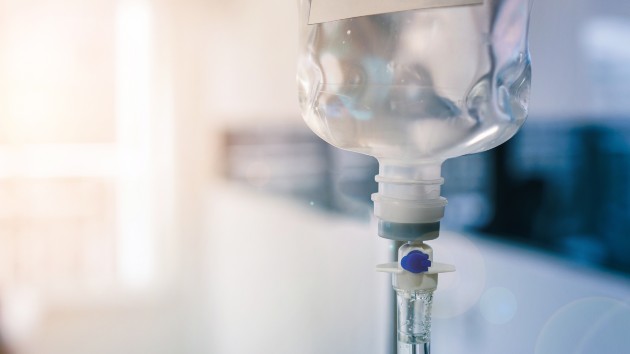
Chanintorn.v/iStock
Chanintorn.v/iStock(NEW YORK) — Erika Cave-Miller is heartbroken.
She’s in mourning because her husband died of novel coronavirus just before his 45th birthday. She’s bewildered because he was diagnosed with pneumonia, then with coronavirus, then placed on a ventilator, then dead — all within a matter of days.
She’s scared because she and her family have all tested positive as well. They’re sitting in their Nassau County, New York, apartment together, day and night.
But when you ask her about plans to put Americans back to work, Cave-Miller gets angry.
“This is not a game,” she said. “People’s lives are ending here.”
In her first interview since Jermaine’s death, Erica told ABC News’ “Start Here” how quickly everything went downhill. It began with chills.
“I feel so cold,” she recalled Jermaine saying on March 11, before they went to urgent care.
He had a fever of 101.5 degrees, was diagnosed with pneumonia, given antibiotics and sent home. The next day, his temperature had reached 103, and that’s when she said they went to the emergency room. Cave-Miller was asked to leave his room for a chat.
It was the last time she’d ever see him in person.
“They put an orange sticker on door, like a hazard sticker, and I said, ‘What is this for?’ And the doctor was like, ‘Well, you know, we tested them for COVID-19,'” she recalled.
“So I said, ‘OK, why can’t I stay with him? Because if he has anything, I’m his wife, I have it too. Let me just stay with him.’ They told me no. They would not let me stay,” Cave-Miller said.
She was told her husband had COVID-19 on March 16.
Shortly after the tests came back positive, Jermaine’s breathing became worse. He was sedated the day after doctors got test results and placed on a ventilator. Erika couldn’t talk to her husband because of the drugs, and she couldn’t hold his hand because of the virus. She resigned herself to sending him text messages that she knew he couldn’t read.
“I would [text] him, you know, ‘Stay strong. You’re gonna get through this,'” she said. “When their son’s grades came back, she texted him again: “He passed his midterms so far. All four. He did a great job.”
Then she got a call from Jermaine’s doctor on March 19.
“He was advising me that what they’re going to do is put him on his front, like lay him on his stomach, for 10 hours and then 10 hours later he’ll be on his back and it was to try to get the air going through his lungs,” she said.
But his doctor called back that afternoon.
His first words were, “I’m sorry.” Erika dropped the phone before she could hear any others.
“I knew what it was,” she said. “I didn’t want to hear no more. I knew what it was.”
The couple’s 20-year-old son and 5-year-old daughter and her 83-year-old mother and her sister were all there. She had to break the news to them.
Then she had to call Jermaine’s parents.
“I had to get it together because I had to call his mom. I had to call his dad,” she said. “Do you know how it felt to call someone’s parents and tell them that their child is gone? That was the worst feeling of my life. The worst. I never ever wish that on nobody.”
In order to see Jermaine’s body, she and her eldest son were fitted with personal protective equipment. They walked in together.
“I just told him, ‘I’m so sorry you had to go through this alone,'” Cave-Miller recalled. “Because he was by himself. I told him, I’m always going to love you and I will continue to take care of our family. And my son looked at him, and said, ‘Dad, I’m going to continue to make you proud.'”
On their way out, they both had to wipe themselves down. Cave-Miller called a funeral home, and was told she could only hold a small funeral due to restrictions on group size.
“Everything is on hold,” she said. “We pray every day, and we’re just here. We’re just riding it out. Because that’s all you can do.”
Between temperature checks, Cave-Miller finds herself thinking about how quickly the pandemic upended her life.
“We could have gotten ahead of this thing,” she said. “We are still in the middle of the fire. We are in the middle of the fire. We are no where near to this being over. We are in the middle. So for somebody to go back to work, back into an office, well guess what, where people’s results are still coming back positive? No. I don’t want to hear that.”
Copyright © 2020, ABC Audio. All rights reserved.